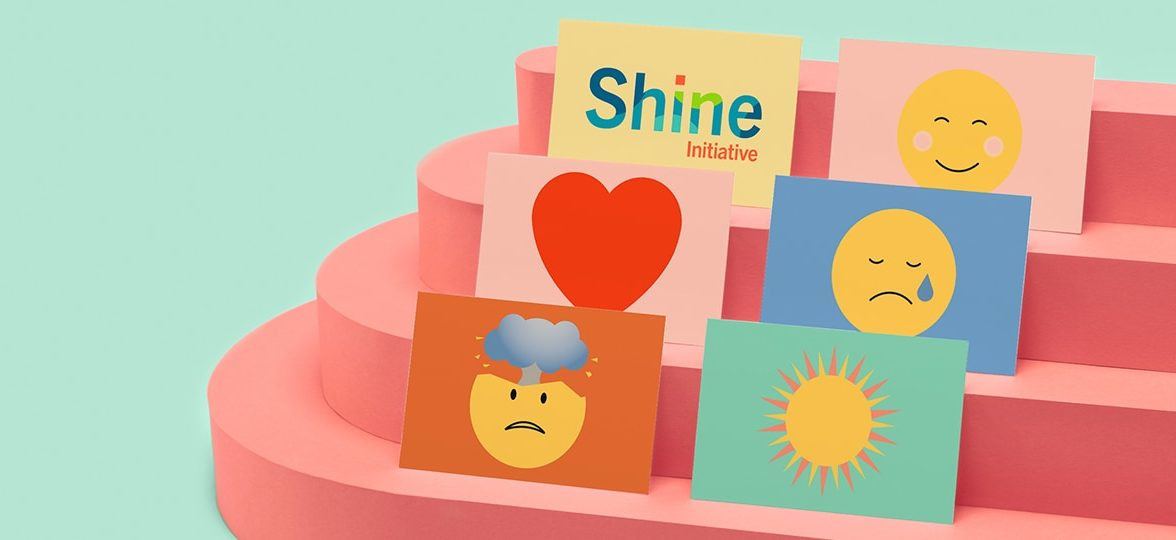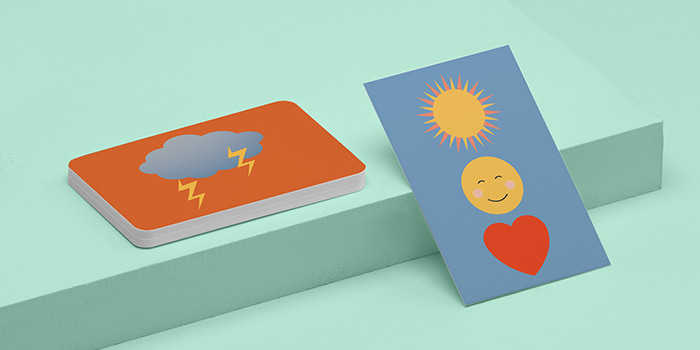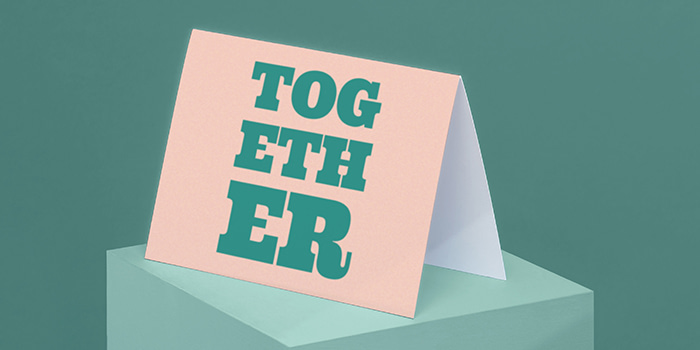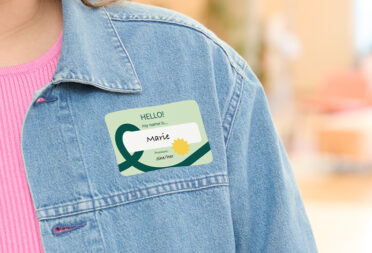How we MAKEIT: normalising talking about mental health with Shine
Learn more about how Shine Initiative helped educate the MOO team on the topic of mental health.

Breaking news: we don’t stop feeling when we’re at work. It seems obvious, and yet talking about mental health in the workplace often remains one of those uncomfortable conversations we’re not sure how to handle.
In a time of hybrid working and after a couple of challenging years, feeling well and supporting each other’s mental health at work has become increasingly difficult. That’s why MOO has partnered with Shine Initiative to offer employees training and a series of workshops to better understand and handle issues related to mental health. They have spanned from basic mental health literacy to crisis management and mental health ambassador training. To make sure the MOO team is well equipped to deal with these topics inside and outside of work.
We asked Fred Kaelin, executive director of Shine Initiative and Lauren Alvarez, leader of our Justice, Equity, Diversity and Inclusion (JEDI) committee to tell us more about how they helped support and educate the MOO team.
Why launch a mental health awareness program at MOO?
Lauren Alvarez: Kate Wood, our Mental Health and Wellbeing committee lead, has been doing great advocacy work in this area for years, and is always looking for ways to educate the team in ways that connect with more MOOsters. The Mental Health and Wellbeing team that she oversees does great work building awareness and keeping our own health front of mind.
Kate and her team are driven by the idea that you have to talk about something to normalise it. We wanted to make sure that we offered content that was accessible and honest. MOO has a fun, engaging, quirky culture that needs to be represented in our internal programming. The tone in mental health programming varies greatly. It’s important to have the words ready, to be comfortable with those words, and to know when to respond when someone is in crisis, or even if someone is just having a bad day.
We wanted to make sure that we could launch an engaging, relatable series that people could apply to work or to their lives outside of work. MOO is such a strong community, those things blend closely together more often than not.

What’s Shine’s mission? How did the partnership with MOO come about?
Fred Kaelin: Shine’s mission is to combat discrimination and to destigmatise mental health conditions in children and young adults. Over the past few years, we have realised that to best effect those changes we need to reach not just young people but everyone – adults, parents, carers, employers, etc.
LA: A friend and former colleague connected me with Fred – we had all worked in the student experiential education world in a past life, which has been ahead of the curve when it comes to supporting the mental health and wellbeing of young people. Shine focuses their work around young people, which is very clear when you start talking to them – they are so easy to talk to and relatable!
What made you think “this is the one”?
LA: The team! We are so grateful for their depth of knowledge, their attention to us as an organisation, their questions and feedback, and how they set a great tone for learning and asking questions.
It’s just so refreshing and disarming to hear real people share their experience
Even in an open culture like MOO’s, it can be difficult to open up and “bring yourself to work”, talking about mental health wins and challenges, and being vulnerable. Fred, Jessika [Zequeira, community education specialist] and the Shine team feel like part of the MOO team. They are fun, funny, engaging, honest, and it’s just so refreshing and disarming to hear real people share their experiences. It makes the content relatable, and the tools more memorable.
What does the partnership between Shine Initiative and MOO look like?
FK: We developed our curriculum from our original programming for high school students, educators, and parents and guardians. The more we talked with different groups, the more we realised that everyone needs to hear about 80% of the same information and messaging on these topics.
We did additional research on mental health in the workplace and added or renewed some of the curriculum. And we always work to get to know the company to individualise it some to best fit the culture and efforts or the workplace. With MOO, that pre-planning process and ongoing feedback have been phenomenal! Kate and Lauren from the JEDI team have such similar ideas and styles to what is natural to us at Shine that it really has been a perfect partnership.
LA: We are very communicative. We carefully set up our first calls, communicated about voice and tone, and are now very comfortable giving and receiving feedback on how to support each other together. We talk before and after our sessions to see what’s happening. All of this collaboration has been through the pandemic so we are navigating our own lives alongside supporting our peers and teammates.
We are launching our mental health ambassadors program soon with Shine, and we are building on our programming in areas specific to the business: for leadership, for the workplace, for parents and carers… We are letting MOOsters guide us on what content to build next based on the engagement and discussions in our workshops. It has been a really fun and engaging experience for us, we have learned a lot about our team! And it has influenced our approach to mental health programming: they’re along on the journey with us.

What are the challenges when discussing mental health issues with an audience of coworkers?
FK: For so long, part of the stigma around mental health is that it only belongs in the private, personal realm, making it traditionally off-limits for workplaces and workspaces. That challenge is certainly there.
However, we are seeing a seismic shift these past few years in employees; a desire to have an open culture in their workplaces around mental health, especially in the context of broader wellness and life balance shifts, and for employers to recognise this and that people who feel taken care of will stay longer and want to do the best they can for their workplace.
What is the benefit of having mental health ambassadors at work?
FK: One thing we know, and the research is clear on, is that if we are concerned for ourselves or a loved one around mental health we are not going to turn to an “authority figure” first – we’re naturally going to turn to a close friend or confidant. That might be all we need. But if we or the person we’re concerned for needs more formal help, having someone to help us or to even just be alongside us to take that step makes it more likely to happen.
Ambassadors are safe, trusted messengers who won’t judge
Mental health ambassadors can help fill that role in the workplace. Coworkers know that the ambassadors are safe, trusted messengers who won’t judge or act in a way that stigmatises them. Colleagues know that they don’t have to be alone in thinking about these things. And even if very few people need to approach the ambassadors in a given year, their presence in the company underscores every day that it is okay to talk about and navigate ups and downs around mental health.
What are the questions you encounter the most?
FK: Most concerns and questions come from a fear-based stance: what happens if someone discloses too much? What happens if no one shows up? What happens if people are uncomfortable? etc. While understandable, most of these are rooted in the overarching stigma that mental health is not to be talked about under any circumstances. We try to talk about a few of the what-ifs to demystify them, and also set an accessible, inviting tone.
Most concerns and questions come from a fear-based stance
We also often encounter it being hard for supervisors and senior leaders to personally reflect on their own mental health ups and downs even while truly believing that it’s good for all their people to feel supported in a more open culture. This is rooted in that idea of the leader always needing to be strong, and then the stigma that mental health struggles = weakness.
While this is understandable in the “real world”, the more supervisors and leadership embrace the culture shift themselves, the quicker it takes hold and becomes authentic. And to be clear, we’re not talking about anyone going into a great degree of specificity, or feeling obligated to share. Just to acknowledge their own journey and to reinforce that the organisation is a supportive place.
Can you tell us a little bit about the impact of this partnership with Shine on MOO employees?
LA: We had a lot of engagement in the sessions, and we noticed a “halo effect” after the sessions, where people were chatting in meetings and over Slack, reflecting some of the terminology used by the Shine team. We have also seen more engagement in our Mental Health and Wellbeing community.
We have gotten great feedback from across the business, and have had requests for more specific and broader topics. For me, personally, I have been able to connect with other people who are engaged in this work and have had better conversations with them. It has been so beneficial as a team to have a shared language around what we are experiencing, together and apart!
We noticed a “halo effect” after the sessions
Part of Shine’s argument is that everyone “has” mental health, and it lives on a spectrum, daily. We need to be intentional about how we navigate it, how we take care of ourselves, and how we support others. From this partnership, we have launched a number of other projects to support MOOsters and to bring awareness to mental health, and we are so excited to continue the partnership with them this year!
Lauren, what has been your favourite part of this partnership so far?
LA: The “parents and carers” sessions have been the most special to me. We have an employee resource group for parents and carers (anyone who supports loved ones at home, a very broad brush!) and our sessions specific to people caring for loved ones have been so special.
Shine balances so well the different “lives” each of us live
Shine balances so well the different “lives” each of us live – our work-selves, our home-selves, our adult-selves, sometimes our parent-selves, and it just spoke so deeply to me. As someone with young children at home, it has really changed the way I approach talking to my boys – not only about their own mental health but about mine and their dad’s as well.
How do you think we can destigmatise mental health at work and make wellness part of the company culture?
FK: Destigmatising mental health at work is all about making it routine through lots of small nudges that over time add up to a more open workplace culture. We as humans respond better to small nudges i.e. pause this hour and do a deep breathing exercise for two minutes, then to big leaps or one-off lectures.
Offering learning sessions, creating ambassadors, clearly articulating the supports that a People team have in place, and having both informal and formal chats about mental health and its importance all add up to normalising mental wellness. And as an aside, MOO was already ahead of many when we first began discussing this partnership, and we’re thrilled to be one part of it these past six months!
Learn more about Shine Initiative here and connect with us on LinkedIn to know more about what MOO’s up to.
Keep in touch
Get design inspiration, business tips and special offers straight to your inbox with our MOOsletter, out every two weeks.




